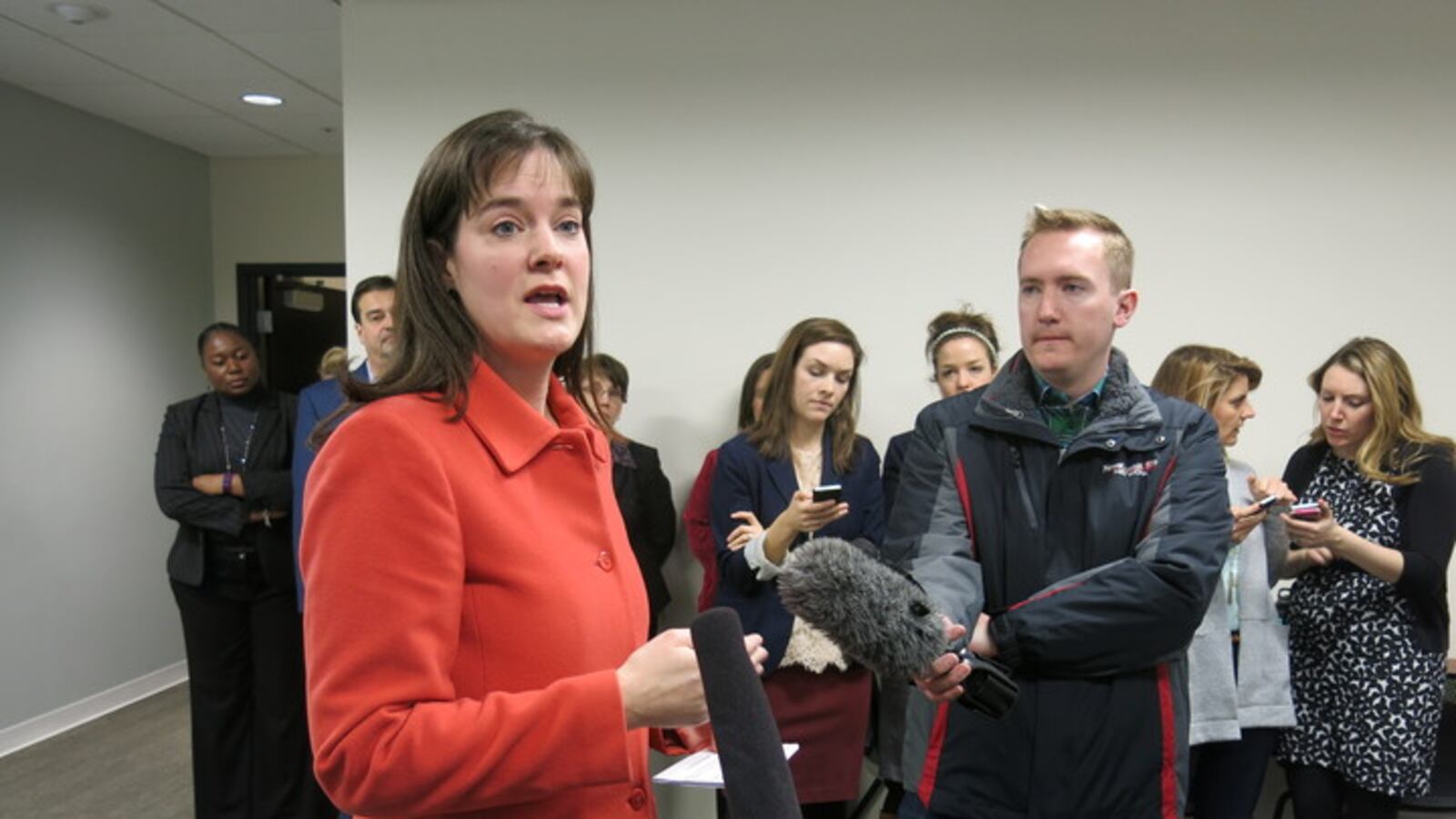One day after technical failures crippled Tennessee’s long-awaited switch to online testing, Education Commissioner Candice McQueen put the blame on the test’s developer and said the state is reviewing its $108 million contract with Measurement Inc.
“We have doubts about them going forward, and yes, we have concerns, and yes, we are reviewing that currently,” McQueen said during a news conference on Tuesday morning, one day after directing school districts to scrub Tennessee’s new online assessment and stick with a paper-and-pencil version for now.
“Our expenditures to Measurement Incorporated are based on what’s actually delivered, and today we don’t have an online platform,” said McQueen, adding that the state has paid the North Carolina vendor only $1.6 million so far.
A relatively small testing company in Durham, Measurement Inc. was awarded the contract in late 2014 to develop Tennessee’s new test, dubbed TNReady, to provide an online platform, as well as to align the assessment with the state’s current Common Core academic standards. Tennessee opted to use a private vendor after its legislature jettisoned the PARCC test, which was created in collaboration with several other states but criticized as federally intrusive because it wasn’t Tennessee-specific.
Measurement Inc. had worked with the state previously to develop a writing test for grades 3-11. And of five vendors bidding for the bigger task, the company stood out, according to state officials.
“It was truly the one that was immediately pointed to because it was the one with the lowest cost and the highest score,” McQueen said.
But on Monday at 8:25 a.m. CST, only minutes after students began using the online testing platform developed by Measurement Inc., a network outage forced students to stop taking the state’s new achievement test, the result of years of development, preparation and testing. By the end of the day, McQueen and her leadership team made to call to scrap the online transition for the school year.
“The new nature of the issue yesterday highlighted the uncertainty around this platform,” McQueen said Tuesday. “Despite the many improvements the department has helped make to the system in recent months, we are not confident in the system’s ability to actually perform consistently.”
Measurement Inc. president Henry Scherich says it was unneccessary for state officials to pull the plug on the online platform and noted that nearly 20,000 Tennessee students successfully completed their assessments on Monday. “Although MI believes that the server overload problem has been corrected, the State made the decision to discontinue online assessments,” he said in a statement released on Tuesday afternoon.
Many states have experienced glitches in their switch to online tests. For the most part, students in states who used PARCC, as Tennessee originally planned, were able to complete their tests online, though they scored lower than their peers who took the PARCC with pencil and paper.
But none of those states’ technical problems appear to have been as widespread as Tennessee’s breakdown — or as far-reaching in its fallout. McQueen’s decision to completely abandon online testing on the first day of the state’s new assessment was jarring and leaves Tennessee education leaders scrambling to assure teachers, students and parents of the test’s accuracy.
“PARCC, as far as I know, had no problems,” said Scott Marion, the director of the National Center for the Improvement of Educational Assessment and a technical advisor for PARCC. “(Tennessee was) on a very fast time schedule from when you left PARCC to when you had to develop a new assessment, and that is always a bit of a challenge.”
Advocates for fair testing note that system failures such as Tennessee’s also occurred in Florida, with other states experiencing significant disruptions in teaching and learning due to the switch to automated assessments.
“The collapse of Tennessee’s new computer testing system on the first day of administration is neither unexpected or unprecedented,” said Bob Schaeffer, public education director for the National Center for Fair & Open Testing, a nonpartisan group monitoring the use of standardized tests.
“Across the country, dozens of jurisdictions have experienced similar technical issues in attempting to introduce automated assessments. … The reason for this spate of problems is that computerized testing is being rushed into the marketplace before it is ready for prime time. Rather than heeding the advice of technology or education experts (or the experience of other states), politicians and ideologues have demanded artificial implementation timetables that do not allow sufficient time to develop the necessary infrastructure,” he said.
McQueen expressed confidence that the shift to TNReady was the right thing to do. Calm and smiling throughout Tuesday’s news conference, she also maintained that Tennessee’s current law factoring data from the test into teacher evaluations is fair because of the state’s agreement to temporarily lower the weight of this year’s test in evaluations — although not totally negating it, as many educators wanted.
”That was truly about technology, to make sure that we didn’t have a technology transition that could harm someone, but only help them,” McQueen said.
She said that the paper version of TNReady, also developed by Measurement Inc., is fully aligned to “the depth and the breadth” of Tennessee’s standards and will give parents, students and teachers better information about students’ readiness for postsecondary education or training.
“TNReady remains, TNReady continues,” she said.
And though no timeline is in place, McQueen expects Tennessee eventually will join the ranks of states administering online tests, meaning that local districts’ investment in time and money for technology for the new test is not in vain.
“The investment has been a good one. The investment has been positive,” she said. “We’re still moving online. It’s the way of the world.”
Editor’s Note: This story has been updated to include a response from the president of Measurement Inc.


